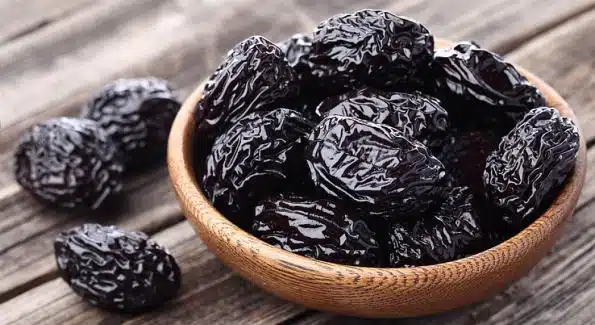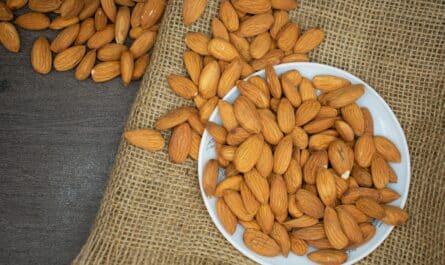Dried prunes are known to be an excellent food for combating constipation. But beyond this generous virtue, prunes have many other benefits that make them a superfruit. What are the 5 benefits of dried prunes?
Benefits of Dried Prunes: A Wellness Food

Dried prunes are obtained by dehydrating plums, and they have a slightly higher nutritional value than fresh plums. They are more energy-giving and also have a more pronounced laxative effect. This is due to their high fiber and sugar content such as glucose, fructose, and approximately 30% sorbitol. Sorbitol is a sugar with low sweetening power but has a strong laxative effect in high doses. 1. A natural anti-aging agent
Moreover, its antioxidant capacity has earned it the right to be considered a natural anti-aging agent. Because its antioxidant vitamins, beta-carotene and vitamin E, help protect skin cells from external aggressions (pollution and sun rays) and preserve cell membranes against free radical attacks. This delays skin aging and the appearance of wrinkles. Combined with polyphenols, they act against all free radical attacks in the body.
2. Against cancer
Another benefit is that plums and dried prunes contain a very significant amount of similar phenolic compounds, particularly flavonoids and phenolic acids, which, according to one study, have a protective effect against colon cancer. They may inhibit the development of colon cancer cells and increase the colon’s antioxidant capacity, thereby reducing colon cancer risk factors.
Furthermore, prunes are a very rich source of fiber, well distributed between soluble and insoluble fiber. 25g of prunes (3 fruits) provide 5% of the recommended daily intake of fiber. A diet rich in fiber is recommended for colon cancer prevention. The high fiber content of prunes is one of the factors that helps combat constipation and also helps prevent colon cancer.
3. Against cardiovascular disease
The fiber in prunes also has protective benefits against cardiovascular disease. A diet rich in fiber helps protect cardiovascular health. The results of a study presented at the American Heart Association conference confirm that fiber is associated with a reduced risk of cardiovascular disease.
Fiber has the ability to lower blood cholesterol levels and thus also limit the risk of atherosclerosis. Furthermore, the high potassium content of prunes reinforces its protective effect against cardiovascular disease by reducing high blood pressure.
4. Against osteoporosis
Dried plum is a food rich in minerals and trace elements. Boron is an essential trace element for the body that is part of it.
It fits into several chemical processes in the body: sugar and fat metabolism, improved brain function, formation of immune system elements, and bone formation. Combined with calcium and vitamin D, boron is a key element for women, particularly in the preservation and preservation of bone capital, especially among postmenopausal women. Because boron deficiency is associated with osteoporosis.
5. Contributes to weight loss
Dry plum is a very essential food when it comes to losing weight. One of its benefits is its fibers, which are a true appetite suppressant and give a sense of satiety, its ability to stimulate and regulate intestinal transit, its low glycemic index and low calorie make it a slimming ally.
Composition of plum:
Vitamins: provitamin A (beta-carotene), vitamins B1, B2, B3, B5, B6, vitamins C and K
Minerals and trace elements: Magnesium, calcium, potassium, iron, zinc, boron
Antioxidants: Polyphenols (tanrins, flavonoids, chlorogenic acid)
Carbohydrates: fructose, glucose, sucrose, sorbitol
Soluble and insoluble fibers: pectin, cellulose
Acids: Chlorogenic acid
Water

